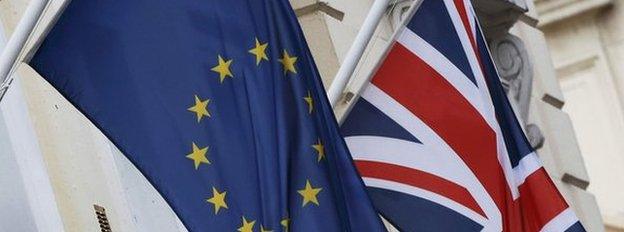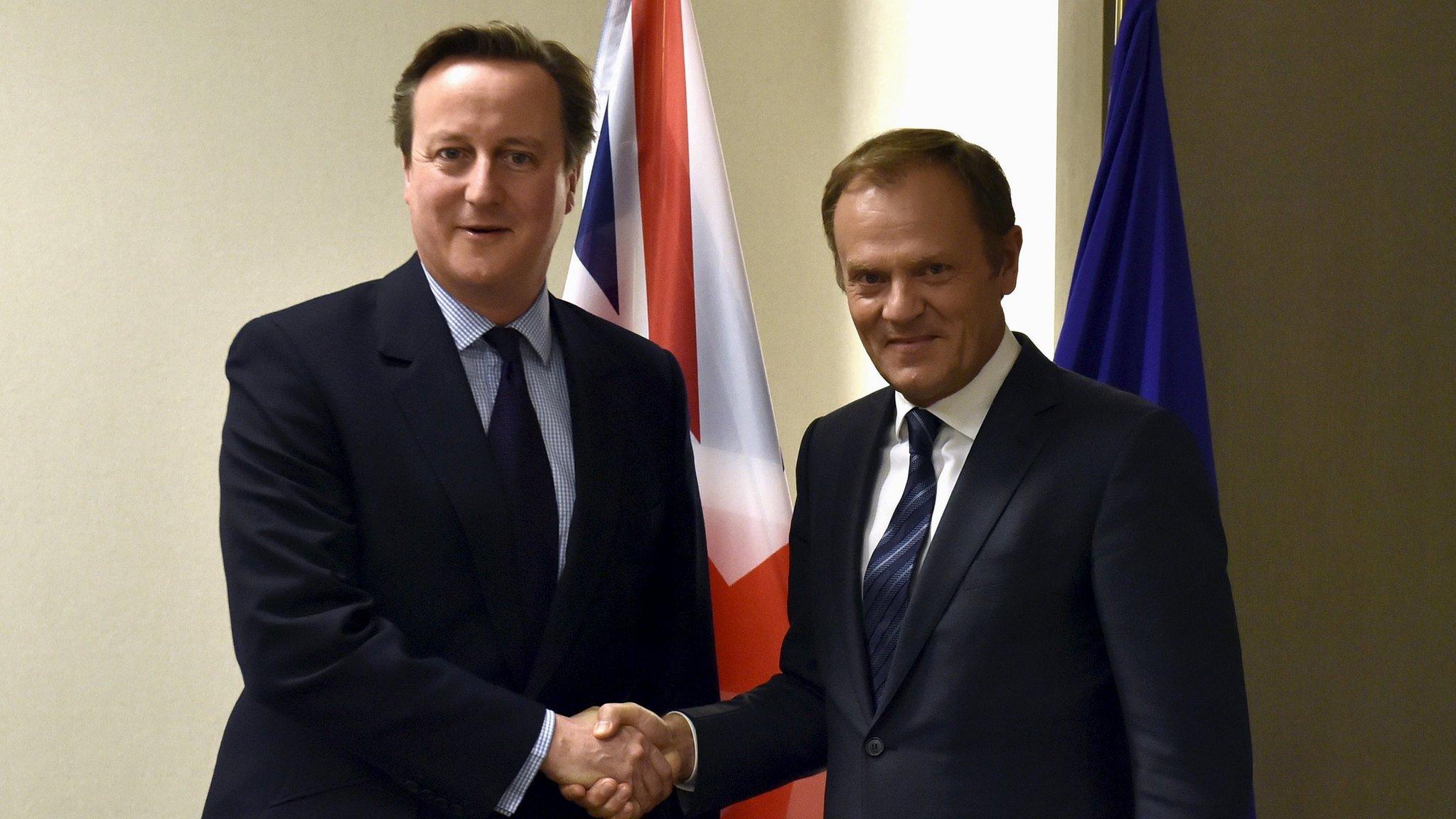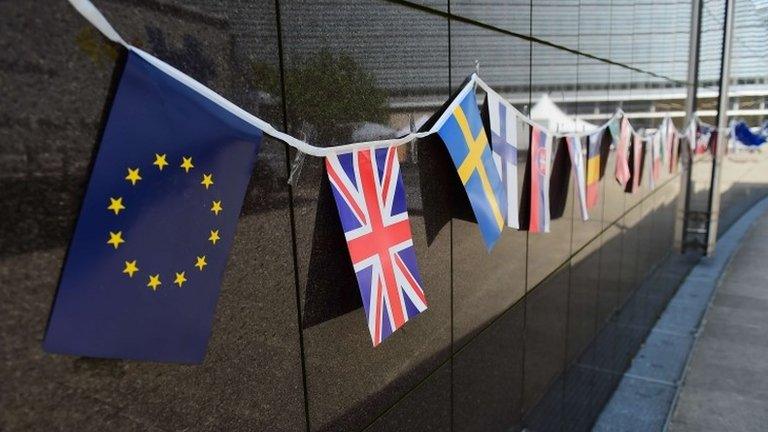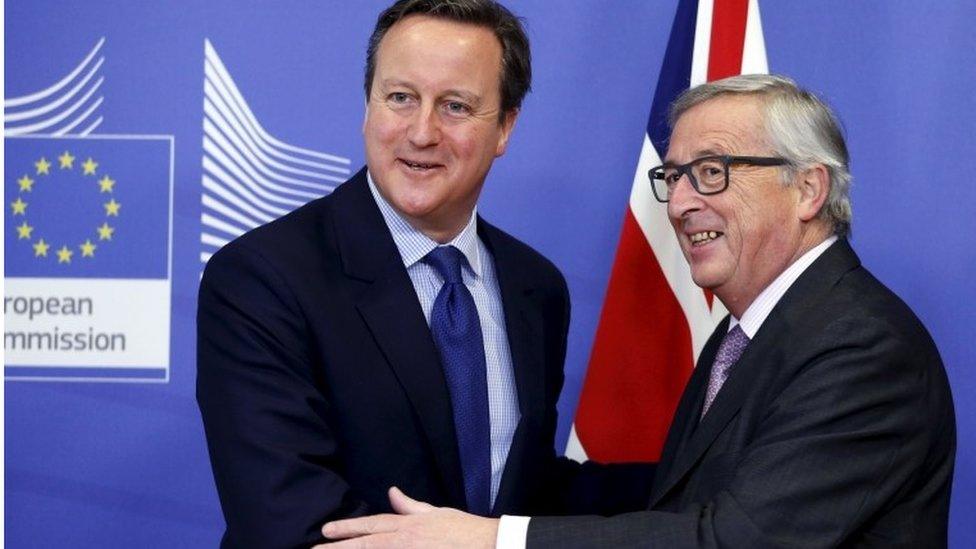EU referendum: Draft reform deal worth fighting for, says Cameron
- Published
- comments
Prime minister responds to BBC political editor Laura Kuenssberg's question
David Cameron says the draft deal aimed at keeping Britain in the EU will deliver the "substantial change" he has been demanding to how it is run.
But the UK prime minister said there was "detail to be worked on" before a crunch summit on 18-19 February.
The deal, external, which includes an "emergency brake" on migrant benefits, paves the way for the UK's EU referendum to take place as early as June.
EU exit campaigners said it did not come close to what the PM had promised.
But the prime minister says it is a deal "worth fighting for" and he is launching a fresh round of diplomacy to persuade other EU leaders to sign up to it.
The draft deal was published by European Council president Donald Tusk after months of negotiations between UK and EU officials.
What's in the draft deal

What is in the draft EU reform proposals?
Mr Cameron's proposed four year ban on in-work benefits for EU migrant workers could come into force immediately if the UK votes to remain in the Union.
But it would have to be agreed by other EU nations and it would be "graduated", with more money from tax credits paid to migrants the longer they remain in the UK.
It says Mr Cameron's demand to exempt Britain from the EU principle of "ever closer union" between member states would be written into a future treaty.
There are also measures relating to protection for non-euro countries in the EU, a new way for member states to club together to block some new EU laws and on business regulations.
Did Cameron get changes he wanted?

Migration: The prime minister got his emergency welfare brake. But it is not clear how easy it will be to pull that brake or how long it will last, writes deputy political editor James Landale.
Benefits: While the in-work benefits of EU migrants will be curbed for four years if other countries agree, they will be gradually restored the longer they stay in the UK. EU migrants will be able to send child benefit back home, but would get a lower level if the cost of living in the country where the child is is lower. Mr Cameron had wanted to block all of it.
Sovereignty: The PM has secured a clear legal statement that the UK is not committed to further political integration and that the phrase "ever closer union" cannot be used to integrate the EU further. But it is not yet clear when or how this will be incorporated into the EU treaties. He has also got new powers for national parliaments to block new EU laws but the thresholds are pretty high before those powers can be used.
Competitiveness: The PM has got some language that commits the EU to strengthen the internal market and cut red tape. But they have been promising to do that for years.
Protecting non-euro countries: There will be a new mechanism to get the eurozone to think again about decisions that could hit the City of London.
Security: The PM has got some unexpected gains, making it easier for countries to stop terror suspects coming into the country even if the threat they pose is not imminent. There will also be a crackdown to stop people using sham marriages and other loopholes to gain access to the EU. Read more: Gavin Hewitt on what PM wanted v what he got
What happens now

Mr Cameron will visit Poland and Denmark on Friday, as he embarks on a whirlwind charm offensive to persuade the other 27 EU leaders to sign up to the Tusk package in Brussels on February 18-19.
If Mr Cameron can get an agreement in February, he is expected to hold a referendum in June on whether Britain should remain in the EU.
Mr Cameron has until the end of 2017 to hold a referendum. A July or September referendum remains a possibility but a repeat of last summer's migrant crisis in the Mediterranean and eastern Europe could make Mr Cameron's job of making the case for remaining in a reformed EU more difficult.
A cross-party group of MPs, led by the SNP, has warned Mr Cameron against holding the EU referendum in June, arguing it will be too close to elections in Scotland, Wales, Northern Ireland, London and local authorities. Labour has said it will not block a June referendum.
What David Cameron said about the deal

The prime minister said "more work" needed to be done to "nail down" details but added: "We said we needed to deliver in four key areas, this document shows real progress on that front."
He said the proposals were some "something worth fighting for", and were good enough that he would back Britain joining the EU under these terms, if it was not already a member.
He said Britain could have the "best of both worlds" by giving it access to the single market and a voice around the top EU table, while retaining its status as a "proud independent country not part of a superstate".
He said ministers would be free to campaign for either side in a personal capacity, but the government would "not be taking some sort of neutral position".
"If we get this deal in February or in March or later and if the cabinet agrees to this deal the government's position will be to campaign for Britain to stay in a reformed European Union."
Asked by the BBC's Laura Kuenssberg if he could guarantee the reforms would cut immigration and had not been watered down, he said: "I can say, hand on heart, I have delivered the commitments made in my manifesto." Read more from Laura Kuenssberg
What those who want the UK to leave the EU say

UKIP leader Nigel Farage described the draft deal as "pathetic"
Richard Tice, co-founder of Leave.Eu, accused Mr Cameron of "trying to deceive the British people by saying that there's substantial change - there is nothing except a restatement of the existing status quo".
The Vote Leave campaign said Mr Cameron had broken a key Conservative manifesto pledge to insist on a four year ban on in-work benefits, saying that the ban was now conditional.
Former defence secretary Liam Fox said the proposals did not "come close" to the changes voters had been promised.
UKIP leader Nigel Farage said Mr Cameron's deal was "pathetic" and "hardly worth the wait".
Donald Tusk's response

Donald Tusk says there is a lot to do in securing Britain a new EU deal
President of the European Council Mr Tusk said the package was "a good basis for a compromise", adding that "there are still challenging negotiations ahead - nothing is agreed until everything is agreed".
Conservative reaction

Two of the favourites to succeed David Cameron as Conservative leader, Boris Johnson and Theresa May, have also been touted as possible figureheads for the campaign to leave the EU. Mr Johnson, the London mayor, said he had "doubts" about the red card mechanism, saying there was "much, much more that needs to be done" on European reform.
Home Secretary Mrs May also said more needed to be done, but added: "This is a basis for a deal." BBC political editor Laura Kuenssberg said she appeared on the verge of backing the prime minister and that her reaction would come as a blow to the Out campaign.
Analysis by BBC Deputy Political Editor James Landale

Mr Cameron may have to spend the next two weeks twisting arms in Europe, there may be no guarantee of a deal and everyone is agreed that nothing is agreed until everything agreed.
But the prime minister is already in campaign mode, bouncing around tiggerishly in his shirtsleeves, selling his deal almost as if it had been agreed. Read more: James says Cameron in campaigning mode
Will other EU nations accept it?

The BBC's Europe Editor Katya Adler says: "My first instinct is that this is something everyone can work with.
"Eastern and Central European countries will continue to complain about the suspension of migrant in-work benefits.
"They are likely to argue that the EU has sold its principles down the river in an attempt to keep the UK in the EU.
"However it can be argued from this text that the so-called 'emergency brake' is not discriminatory because it's available for any country to use." Read more: Katya's blog in full
Further reading on the UK's EU referendum

Guide: All you need to know about the referendum
National parliament powers: What do the red and yellow cards plans mean?

- Published31 January 2016

- Published17 February 2016

- Published29 January 2016
